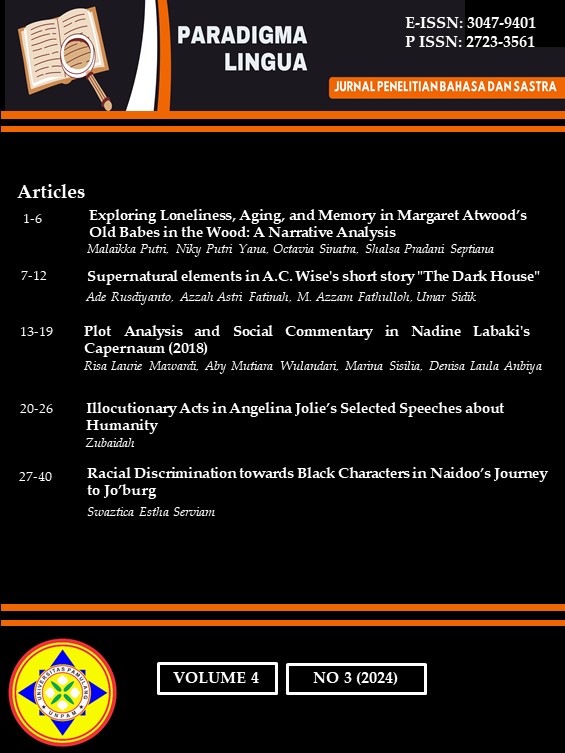Supernatural elements in A.C. Wise's short story "The Dark House"
Keywords:
supernatural elements, short story, A.C. Wise, horror, psychological depthAbstract
This study explores the supernatural elements in A.C. Wise's short story The Dark House, focusing on how these elements shape the narrative and contribute to its eerie and unsettling atmosphere. The research aims to provide a comprehensive analysis of how supernatural motifs, such as the haunting presence, the house's malevolent influence, historical curses, recurring misfortune, unexplained sensations, occult voices, and supernatural artifacts, enhance the horror and psychological depth of the story. Using a qualitative descriptive approach, the study identifies and examines recurring supernatural themes that are central to the creation of tension and fear. The findings underscore the significance of these elements in amplifying the overall horror and emotional complexity of The Dark House, making it an exemplary piece of supernatural literature.
References
Biklen, B. (1982). Qualitative research for education: An introduction to theory and methods.
Filomeno, A. L. (2019). The supernatural paradigm: Classifying supernatural elements within Shakespearean plays. Regent University.
Gay, L. R., Mills, G. E., & Arasian, P. (2006). Educational research: Competencies for analysis and application. New Jersey: Pearson Education, Inc.
Girsang, M., Ginting, B., Tamba, A. R., Samosir, A. C., & Kianlin, J. A. (2023). Intrinsic elements in digital short stories: ‘The Oval Portrait’ by Edgar Allan Poe. Journal of Language.
Malik, V. (2019). The supernatural in Hamlet and Macbeth.
Merleau-Ponty, M. (1973). The prose of the world. Northwestern University Press.
Nurmalasari, M., & Adha, R. (2016). Supernaturalism and mysticism in William Shakespeare’s play Hamlet. JL3T (Journal of Linguistics, Literature and Language Teaching), 2(2).
Sugiyono, M. (2008). Qualitative and quantitative research R&D. Bandung: Alfabeta.
Vídalín, A. (2015). Some thoughts on the supernatural, the fantastic, and the paranormal in medieval and modern literature.
Downloads
Published
How to Cite
Issue
Section
License
Authors who publish with this journal agree to the following terms:
- Authors retain copyright and grant the journal right of first publication with the work simultaneously licensed under a Creative Commons Attribution License that allows others to share the work with an acknowledgement of the work's authorship and initial publication in this journal.
- Authors are able to enter into separate, additional contractual arrangements for the non-exclusive distribution of the journal's published version of the work (e.g., post it to an institutional repository or publish it in a book), with an acknowledgement of its initial publication in this journal.
- Authors are permitted and encouraged to post their work online (e.g., in institutional repositories or on their website) prior to and during the submission process, as it can lead to productive exchanges, as well as earlier and greater citation of published work (See The Effect of Open Access).
Paradigma Lingua have CC-BY-SA or an equivalent license as the optimal license for the publication, distribution, use, and reuse of scholarly work.
In developing strategy and setting priorities, Paradigma Lingua recognize that free access is better than priced access, libre access is better than free access, and libre under CC-BY-SA or the equivalent is better than libre under more restrictive open licenses. We should achieve what we can when we can. We should not delay achieving free in order to achieve libre, and we should not stop with free when we can achieve libre.


